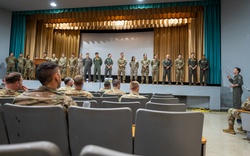JOINT BASE LEWIS-MCCHORD, Wash. – When you visit Waikiki, Hawaii, it is easy to understand the popularity. With spectacular views, beautiful turquoise water, rolling waves perfect for surfing, soft sandy beaches, and within a few short minutes’ walk from major hotels, it’s an amazing location for a perfect vacation or wonderful day trip. With all of this popularity comes a high level of visibility.
For a father whose child is having a traumatic medical event, this kind of visibility provides help from every direction in the way of good Samaritans.
Luckily for the father and young child, they were spotted by U.S. Air Force Tech. Sgt. Kyle McNamara, 62d Operations Support Squadron Survival Evasion Resistance and Escape operations noncommissioned officer in charge.
While taking a stroll on the beach McNamara noticed a frantic man hovering over a young boy. Instantly McNamara rushed over to provide help and see what was going on. The man said that his son was having a seizure, and that it had started in the water, McNamara said.
Suddenly McNamara’s training kicked in and he determined the best course of actions quickly and efficiently. He immediately called for assistance which came quickly from Staff Sgt. Cori Andrews, 62d Medical Squadron independent duty medical technician. They both knew the situation was dire and needed to be handled properly and timely, they said.
“The boy was quivering, breathing very rapidly, and breathing fairly shallow but it wasn’t to the point that his lips were turning blue,” said Andrews. “Nothing was indicative of a lack of sufficient oxygen.”
Andrews asked several quick questions and determined that the child had a history of seizures but never had one in the water. The danger of this child having water in their lungs was obvious, said Andrews.
She communicated that when someone is actively having a seizure there isn’t very much that you can do medically without specialized equipment. In that moment a medical professional’s job is ensuring the person does not harm themselves or anyone else, and verifying their airways are clear and unobstructed, she said.
In the same moment that Andrews was providing lifesaving medical care and attempting to ease the father and child during this traumatic event, McNamara was simultaneously calling 911, attempting to control the increasing crowd of people around the situation, and procuring an umbrella to provide shade and privacy.
“In my mind, I was just doing what anybody else would have done in that situation,” said McNamara.
Quickly after McNamara called 911, he could hear the sirens close to the road. After meeting them at their vehicle and giving them as much information about the situation as he could, he was reassured by the Honolulu Emergency Medical Services technician that McNamara and Andrews had done everything right.
After the medical team transported the father and son to a nearby hospital, and after the adrenaline of the situation wore off, both McNamara and Andrews had adequate time to reflect.
“Tech. Sgt. McNamara and I are both military trained, and we run through these scenarios all the time,” said Andrews. “It was surprising to me how nobody was taking action, but as soon as we got on the scene it was just down to business. We did exactly what we needed to do, and we knew our roles.”
While describing the situation’s events, McNamara and Andrews were both quick to give the other the majority of the credit for helping the child in the situation. In the end, they both agreed the situation went as smoothly as it possibly could have given what happened. They also communicated their hope for the father and son’s future.
“That could have been my kid, right?” said McNamara. “That’s something that you hope never happens, but I believe he’s good now and I hope that he went and got ice cream and that they enjoyed the rest of their vacation safely.”
Andrews’ supervisor, Maj. Christine Hargrave, 62d Medical Squadron aerospace medicine flight commander, like many other Airmen from Team McChord, was in Hawaii for Rainier War 25A and Joint Pacific Multinational Readiness Center 25-01, and quickly heard about the medical situation.
“Tech. Sgt. McNamara and Staff Sgt. Andrews’ ability to stay composed and apply their training under pressure helped ensure the child received timely medical attention,” said Hargrave. “Their actions exemplified professionalism and preparedness in a critical moment.”
![Airmen save child during Rainier War 25A, JPMRC 25-01]()
